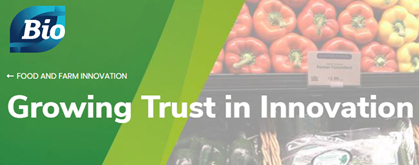In the remaining weeks before Election Day 2020, biotechnology developers are speculating on how innovation will be treated under various election outcome scenarios.
Consistent with its Executive Order on Modernizing the Regulatory Framework for Agricultural Biotechnology Products, the Trump Administration has worked to modernize its oversight of biotech plants to keep up with evolving science.
In May, the USDA announced its final “Sustainable, Ecological, Consistent, Uniform, Responsible, Efficient (SECURE) rule” to update its biotechnology regulations under the Plant Protection Act. Just last month, EPA released its proposed rule to streamline EPA's oversight of pest-resistant plants.
These efforts follow similar actions undertaken during the Obama Administration, including release of its National Bioeconomy Blueprint aimed at “building a foundation for the future bioeconomy” including putting in motion an overhaul of regulations that held back innovation.
For more than a decade, scientific progress has largely been a bipartisan issue, and the biotechnology industry is hopeful that this approach will continue, no matter which party controls Congress or the White House. Because there is more to do.
While progress has been made on plant biotechnology, academics, technology developers, farmers, and ranchers – especially livestock producers – are still waiting for some movement on regulation of animal biotechnology and gene-edited animals, currently under authority of the FDA.
The shortcomings of the current regulatory process have been explained in recent media reports:
- A Healthy and resilient world needs animal biotech innovation
- Don't let red tape stifle benefits of biotechnology
- Unleash the next frontier of animal agriculture
- We need USDA in driver’s seat on gene-edited livestock
- Coronavirus outbreak stresses need for One Health and animal biotech advancement
- FDA on mission to explain its animal biotech approval process
- Wrangling over animal biotechnology regulatory turf must end
The fact is, innovations in biotechnology for food and the farm are solving complex challenges that will create a more resilient food system, and policymakers on both sides of the aisle are beginning to seed the ground for future breakthroughs. You can follow the evolution of these efforts on BIO’s Growing Trust for Innovation web site.
BIO strongly believes these modernized approaches must be science-based and provide relevant transparency to consumers so that we can establish a system that allows innovation to flourish. That’s why regulatory reforms must be accompanied by meaningful education and outreach efforts.
BIO recently unveiled a transparency compact and will be working to operationalize that over the next few months. In the meantime, there are several web-based resources that are working to grow the public’s trust about the use of biotech in food and agriculture:
- Together with the USDA and EPA, the FDA launched earlier this year “Feed Your Mind,” a consumer education initiative to provide science-based information on genetically engineered foods. Just this week, Feed Your Mind added new resources including new videos, fact sheets, and a high school curriculum.
- Innovature is a joint project of BIO and the American Seed Trade Association (ASTA) highlighting gene editing’s contributions to agriculture, food, and wellness. The Innovature content hub houses articles and other resources while the accompanying social media platforms promote a dialogue about agriculture innovation, science, and nature among influencers and the public.
- GMO Answers, funded by the members of CropLife International, has used its online portal and pool of more than 200 experts to answer thousands of questions in real time about GMOs in food and agriculture. The program, in existence since 2013, continues to add to its library of resources and drive a conversation on social media.





.jpg?itok=5epg0qxZ)















.png)


